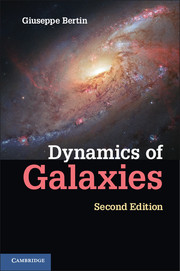Book contents
- Frontmatter
- Contents
- Preface to the Second Edition
- Preface to the First Edition, 2000
- Acknowledgments
- PART I Basic Phenomenology
- PART II Physical Models
- PART III Spiral Galaxies
- 13 Orbits
- 14 The Basic State: Vertical and Horizontal Equilibrium of the Disk
- 15 Density Waves
- 16 Roles of Gas
- 17 Global Spiral Modes
- 18 Spiral Structure in Galaxies
- 19 Bending Waves
- 20 Dark Matter in Spiral Galaxies
- PART IV Elliptical Galaxies
- PART V In Perspective
- Bibliography
- Index of objects
- Index
13 - Orbits
from PART III - Spiral Galaxies
Published online by Cambridge University Press: 05 June 2014
- Frontmatter
- Contents
- Preface to the Second Edition
- Preface to the First Edition, 2000
- Acknowledgments
- PART I Basic Phenomenology
- PART II Physical Models
- PART III Spiral Galaxies
- 13 Orbits
- 14 The Basic State: Vertical and Horizontal Equilibrium of the Disk
- 15 Density Waves
- 16 Roles of Gas
- 17 Global Spiral Modes
- 18 Spiral Structure in Galaxies
- 19 Bending Waves
- 20 Dark Matter in Spiral Galaxies
- PART IV Elliptical Galaxies
- PART V In Perspective
- Bibliography
- Index of objects
- Index
Summary
The theory of orbits is important in the study of the dynamics of galaxies. Because the relaxation times for the relevant processes are very long (see Chapter 7), much of the interest lies in the study of orbits in a mean field. What is learned from these studies applies beyond the case of single particles, for the evolution operator in a continuum description (either in a fluid or in a stellar dynamical description; see Chapter 8) can be essentially identified with the Hamiltonian that governs single-particle orbits.
Galaxy disks are relatively cool systems; that is, most star (or gas cloud) orbits are very close to being circular, so a typical star (or gas cloud) velocity at a given location is very close to the average velocity of rotation of the disk. A proper description of a collection of orbiting particles should be given in terms of a distribution function (see Chapter 14). However, the physically intuitive properties of such cool disks can be easily traced back to the characteristics of quasi-circular orbits of individual particles, which are outlined in this chapter. The deviations from circular orbits are called epicycles. To lowest order, they correspond to a harmonic oscillator in the radial direction characterized by the epicyclic frequency k.
Information
- Type
- Chapter
- Information
- Dynamics of Galaxies , pp. 143 - 161Publisher: Cambridge University PressPrint publication year: 2014
